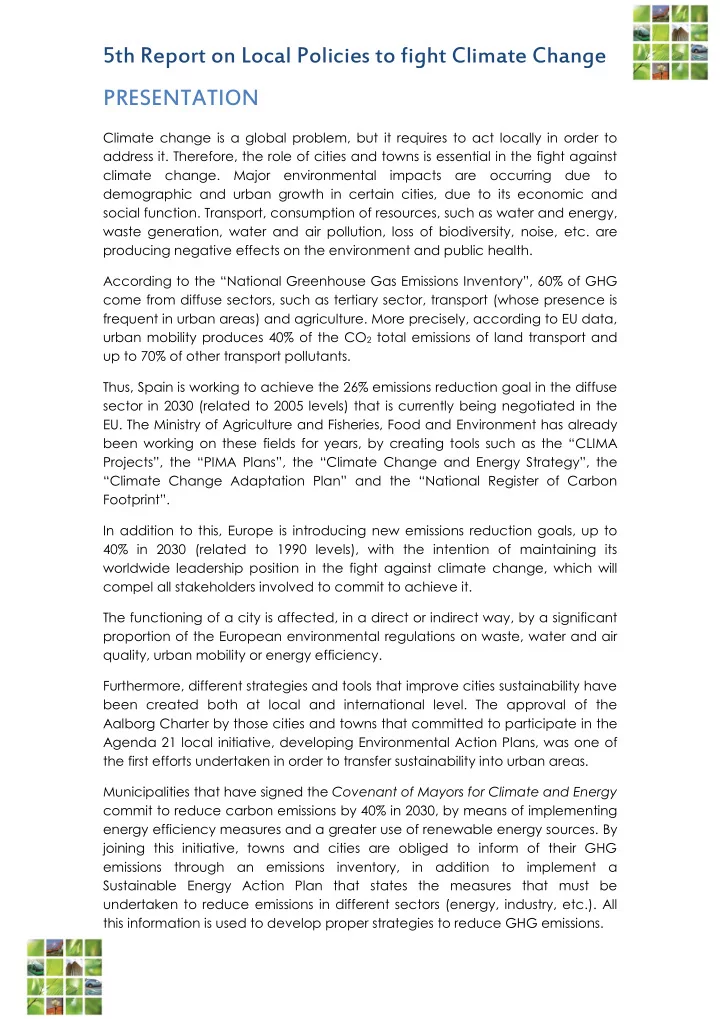

5th Report on Local Policies to fight Climate Change PRESENTATION Climate change is a global problem, but it requires to act locally in order to address it. Therefore, the role of cities and towns is essential in the fight against climate change. Major environmental impacts are occurring due to demographic and urban growth in certain cities, due to its economic and social function. Transport, consumption of resources, such as water and energy, waste generation, water and air pollution, loss of biodiversity, noise, etc. are producing negative effects on the environment and public health. According to the “National Greenhouse Gas Emissions Inventory”, 60 % of GHG come from diffuse sectors, such as tertiary sector, transport (whose presence is frequent in urban areas) and agriculture. More precisely, according to EU data, urban mobility produces 40% of the CO 2 total emissions of land transport and up to 70% of other transport pollutants. Thus, Spain is working to achieve the 26% emissions reduction goal in the diffuse sector in 2030 (related to 2005 levels) that is currently being negotiated in the EU. The Ministry of Agriculture and Fisheries, Food and Environment has already been working on these fields for years, by creating tools such as the “ CLIMA Projects”, the “PIMA Plans”, the “Climate Change and Energy Strategy”, the “Climate Change Adaptation Plan” and the “National Register of Carbon Footprint” . In addition to this, Europe is introducing new emissions reduction goals, up to 40% in 2030 (related to 1990 levels), with the intention of maintaining its worldwide leadership position in the fight against climate change, which will compel all stakeholders involved to commit to achieve it. The functioning of a city is affected, in a direct or indirect way, by a significant proportion of the European environmental regulations on waste, water and air quality, urban mobility or energy efficiency. Furthermore, different strategies and tools that improve cities sustainability have been created both at local and international level. The approval of the Aalborg Charter by those cities and towns that committed to participate in the Agenda 21 local initiative, developing Environmental Action Plans, was one of the first efforts undertaken in order to transfer sustainability into urban areas. Municipalities that have signed the Covenant of Mayors for Climate and Energy commit to reduce carbon emissions by 40% in 2030, by means of implementing energy efficiency measures and a greater use of renewable energy sources. By joining this initiative, towns and cities are obliged to inform of their GHG emissions through an emissions inventory, in addition to implement a Sustainable Energy Action Plan that states the measures that must be undertaken to reduce emissions in different sectors (energy, industry, etc.). All this information is used to develop proper strategies to reduce GHG emissions.
5th Report on Local Policies to fight Climate Change Cities of the future, so called Smart Cities, integrate the commitment of environmental protection with the most advanced technological infrastructures, simplifying citizenship interaction with urban elements and the environment.
5th Report on Local Policies to fight Climate Change SUMMARY The “ 5 th Report on Local Policies to fight Climate Change” continues the work that started back in 2007. Thus, the main objective of the report is to continue the monitoring of the progress made on climate change policies and actions undertaken by the municipalities that have joined the Spanish Network of Cities for Climate The Local Governments of the Network have collaborated in the elaboration of this report by answering a questionnaire with information on the activities that have undertaken to reduce GHG emissions in the following fields: mobility, energy efficiency, renewable energies and carbon sinks. Moreover, a study of the existing climate change regulations, proceedings and financing sources at European, national and regional levels has been undertaken in order to make these tools known to Spanish municipalities. Local Governments that belong to the Spanish Network of Cities for Climate represent 58% of Spain total population. 58% of these municipalities have also signed the Covenant of Mayors and committed to reduce their carbon emissions by 20% in 2020. Furthermore, 11% have set the goal of reducing carbon emissions by 40% in 2030, while 16% have committed to establish climate change adaptation policies. In the energy field, 77% of the municipalities inquired have incorporated renewable energy sources in their municipal facilities and more than 50% have made investments in energy efficiency measures. Regarding transport, 70% have developed or are developing a Sustainable Urban Mobility Plan, more than 50% are already implementing sustainable mobility measures and 93% are increasing or planning to increase the number of green areas in their urban planning. Besides, 31% of the Local Governments are offering benefits in local taxes (IBI or IVTM) to stimulate the acquisition of more energy efficient houses and vehicles and 34% include sustainable criteria in their procurement processes. Regarding CO 2 sequestration through carbon sinks, 20% of the municipalities have undertaken projects in this field, while 20% have developed climate change adaptation plans. As a result of these policies, Local Governments belonging to the Spanish Network of Cities for Climate have reduced their emissions by 23% in a 10 year- period (2005-2015), according to the assessment undertaken through the calculation of the European A2 indicator “Local contribution to global climate change”.
5th Report on Local Policies to fight Climate Change Finally, it is necessary to highlight that 87% of the GHG diffuse emissions of the Spanish Network of Cities for Climate municipalities belong to the energy sector (including mobility), 10.6% to the agriculture and 5.7% to waste management.
Recommend
More recommend